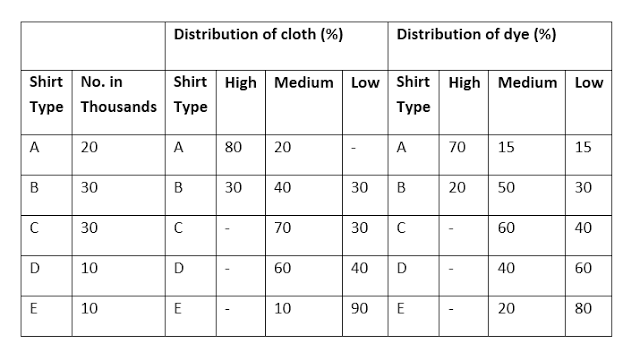for questions 1 to 5: Answer the questions based on the following information.
A, B, C, D and E — using cloth of three qualities — high, medium and low -,
using dyes of three qualities — high, medium and low. One shirt requires 1.5 m
of cloth. The following table gives respectively:
produced, in thousands
quality in each type of shirt, and
quality in each type of shirt.
consumed?
consumed by A-type shirts?
of dyes in high-quality cloth?
used for C-type shirts to that used for D- type shirts?
We recommend:
- NICL AO 2017 Mock Tests – click here
- NIACL Assistant Mock Tests – Click here
- SBI PO 2017 Mock Tests – Click here
{6-11}: Study the following information carefully and answer accordingly.
companies A, B and C. The employees of the company speak at least one of the
three languages, viz. English, Hindi and French, in following manner:
700 employees speak Hindi, 600 speak English and 555 French. In company B, 650
speak Hindi, 580 speak English and 700 speak French and in company C, 500 speak
Hindi, 600 English and 700 French. The number of employees of company A who
speak only Hindi is equal to that of company C who speak English and French but
no Hindi. It is also equal to that of company B who speak all the three
languages. The number of employees of company C who speak only French is equal
to 180, which is 20% more than the number of employees of company B who speak
only Hindi. The ratio of the number of employees of company C who speak only
English to the number of employees of company A who speak only French to the
number of employees of company B who speak only Hindi is 2:4:5. The number of
employees of company A who speak only English is equal to the number of
employees of company who speak only French, which is equal to 180, which is
also 25% less than those who speak English and French but not Hindi in company
C. The number of employees of company C who speak Hindi and French but not
English is equal to the number of employees of company A who speak Hindi and
English but not French, which is equal to the number of employees of company B
who speak English and French but not Hindi. The number of employees of company
A who speak French and Hindi but not English is 165, which is 10% more than
those who speak Hindi and French but not English in company C.
English but not French in company C?
languages in company A?
the three languages in company B?
who speak English and French but not Hindi is what per cent more than the
number of those who speak only Hindi in company C?
number of employees of company C who speak all the three languages and the
number of employees of company B who speak only English?
number of employees of company B is more than that of C?
Answers & Solutions:
1. a Total requirement of cloth
= Total number of shirts × Cloth required per shirt
= (20 + 30 + 30 + 10 + 10) × 1000 × 1.5 = 1,50,000 m.
2. b Total low quality cloth consumed
= 1.5 (30% of 30000 + 30% of 30000 + 40% of 10000
+ 90% of 10000) = 46,500 m.
3. c Total quantity of high quality cloth consumed by A-type
shirts = (80% of 20000) × 1.5 = 24,000 m.
4. d We only know the relationship between the type of shirt
and cloth used and type of shirt and dye used. We
cannot find any relationship between type of cloth and
dye used.
5. b Amount of low quality die used for C-type shirts
= (40% of 30000) = 12,000 units.
Amount of low quality die used for D-type shirts
= (60% of 10000) = 6,000 units.
Hence, required ratio = 2:1
6-10:
4
1
2
3
5
2
ep
Recommended Test Series
(adsbygoogle = window.adsbygoogle || []).push({});
Regards
Team ExamPundit
This post was last modified on June 2, 2019 10:29 am





